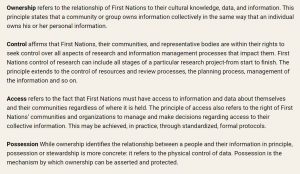There exists a bidirectional relationship between self-identity and self-determination. To be able to discover who you are, you need opportunities to grow, learn, evolve and advocate for yourself. In doing so, you solidify who you know yourself to be. Who you know yourself to be can also be influenced by what you uncover when you become who you want to be. Therefore I believe you cannot speak to self-identity without speaking to self-determination and vice versa.
The First People’s of Canada have been prescribed identities by colonizers since they first came to North America. They have been classified and given status or had it taken away if married out of their tribes. They have been prescribed identities by bodies of government in order to carry out cultural genocides. They have been known as savages and now survivors. This prescribing of identity needs to end and ownership given back to the First People’s of Canada. It is their time to tell their stories, share their identities and change the narrative. It is also time for them to determine who they are within a colonial society and who they want to be. It is time they take their power back by sharing their stories, their successes, and dismantling and decolonizing the ‘West’ and their worldviews with the help of their allies.
I wanted to share a poem, written and read by Dennis Saddleman. He attended residential school in Kamloops as a child, against his will, and has had to battle with the consequences of time spent there. Dennis was able to put his anger from that time of his life into creative writing and has become a huge success, speaking at many events domestically and internationally. The stories of his identity and self determination through the use of poetry are powerful and moving. Dennis’ story is of success and resiliency.
Support is available for anyone affected by the lingering effects of residential schools, and those who are triggered by the latest reports. A national Indian Residential School Crisis Line has been set up to provide support for former students and those affected. People can access emotional and crisis referral services by calling the 24-hour national crisis line: 1-866-925-4419.
